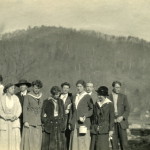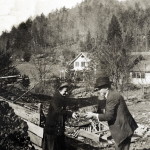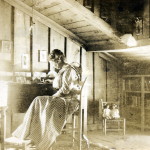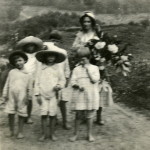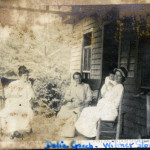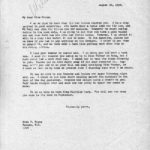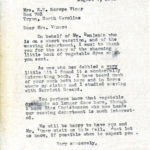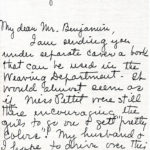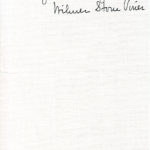Pine Mountain Settlement School
Series 09: BIOGRAPHY – Staff
Series 15: ARTS AND CRAFTS
Helen Wilmer Stone, Housemother 1914-1922
Helen Wilmer Stone Viner (c.1891- 1978)
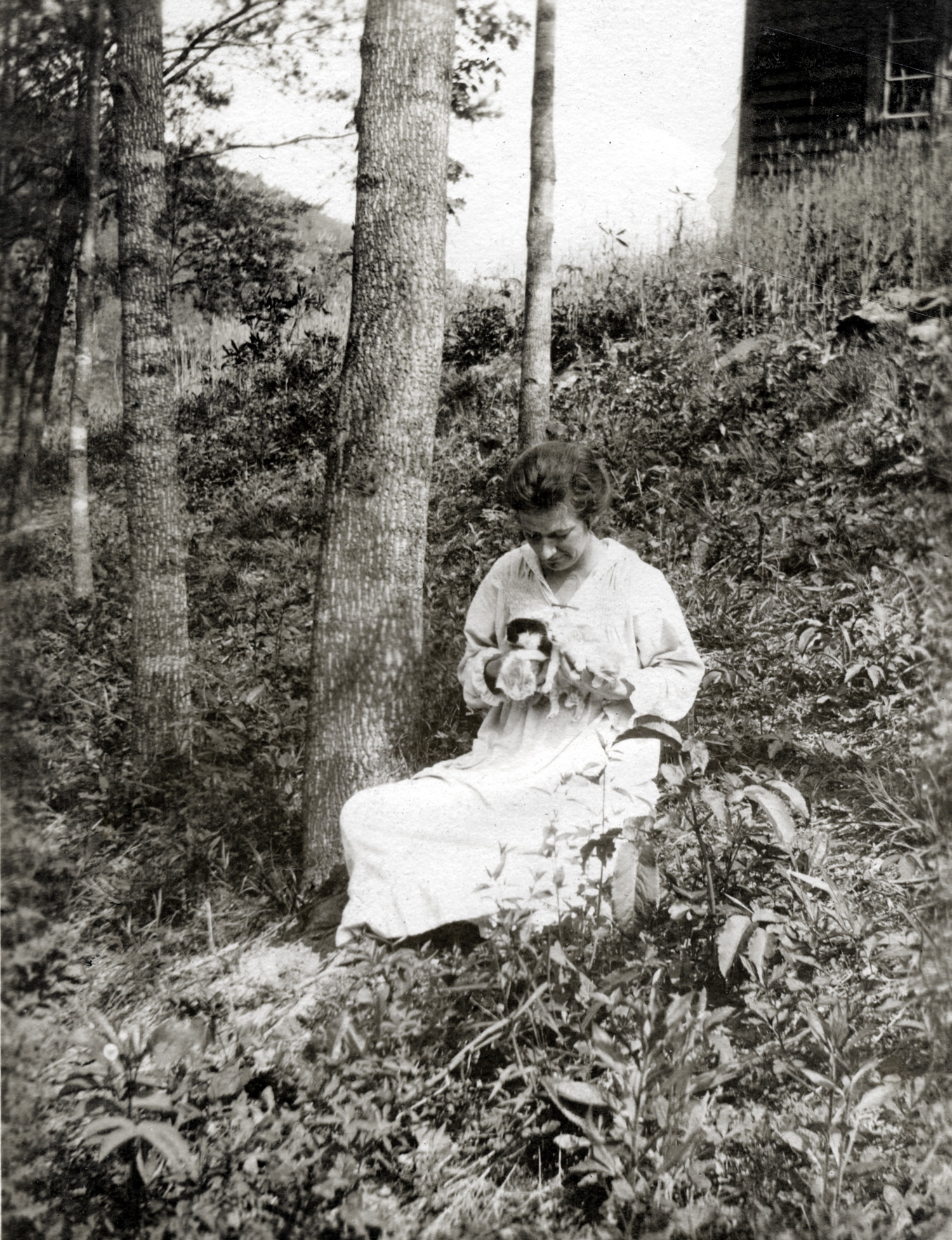
Helen Wilmer Stone Viner. [X_099_workers_2506_mod.jpg]
TAGS: Helen Wilmer Stone Viner, Marguerite Butler, mountain crafts, PMSS housemothers, cottage industries, Clementine Douglass, Shanty Shane, Saluda NC, weaving, natural dyes, craft revival movement, Henry Edward Scrope Viner, craft enterprises, Biltmore Estate Industries, Southern Highland Craft Guild, scrapbooks of weaving samples
HELEN WILMER STONE VINER Staff
Housemother 1914-1922
Helen Wilmer Stone (Viner) (c.1891-1978) was born in Red Fish, Louisiana, a plantation near New Orleans, according to biographical information found in Philis Alvic’s carefully researched Weavers of the Southern Highlands (2003), census records, and Vassar College records. Her attendance at Vassar put her in touch with other Vassar graduates who knew Pine Mountain Settlement School or worked there, especially Marguerite Butler, who came to Pine Mountain the same year (1914) as Stone.
Helen Wilmer Stone (apparently she preferred the simple Wilmer Stone) was evidently born into a family of wealth and privilege. The family spent summers in the cool mountains of Saluda, North Carolina, a favorite summer retreat for wealthy northerners as well as over-heated southerners escaping the prosperous plantations of the South. It was the Saluda-Vassar connection that brought her to Pine Mountain, but it was the Saluda craft environment and her years at Pine Mountain that gave her a deep appreciation for mountain craft. When the two interests crystalized in Wilmer Stone, she spent the remainder of her life as a craftsperson.
HELEN WILMER STONE (VINER): At Pine Mountain
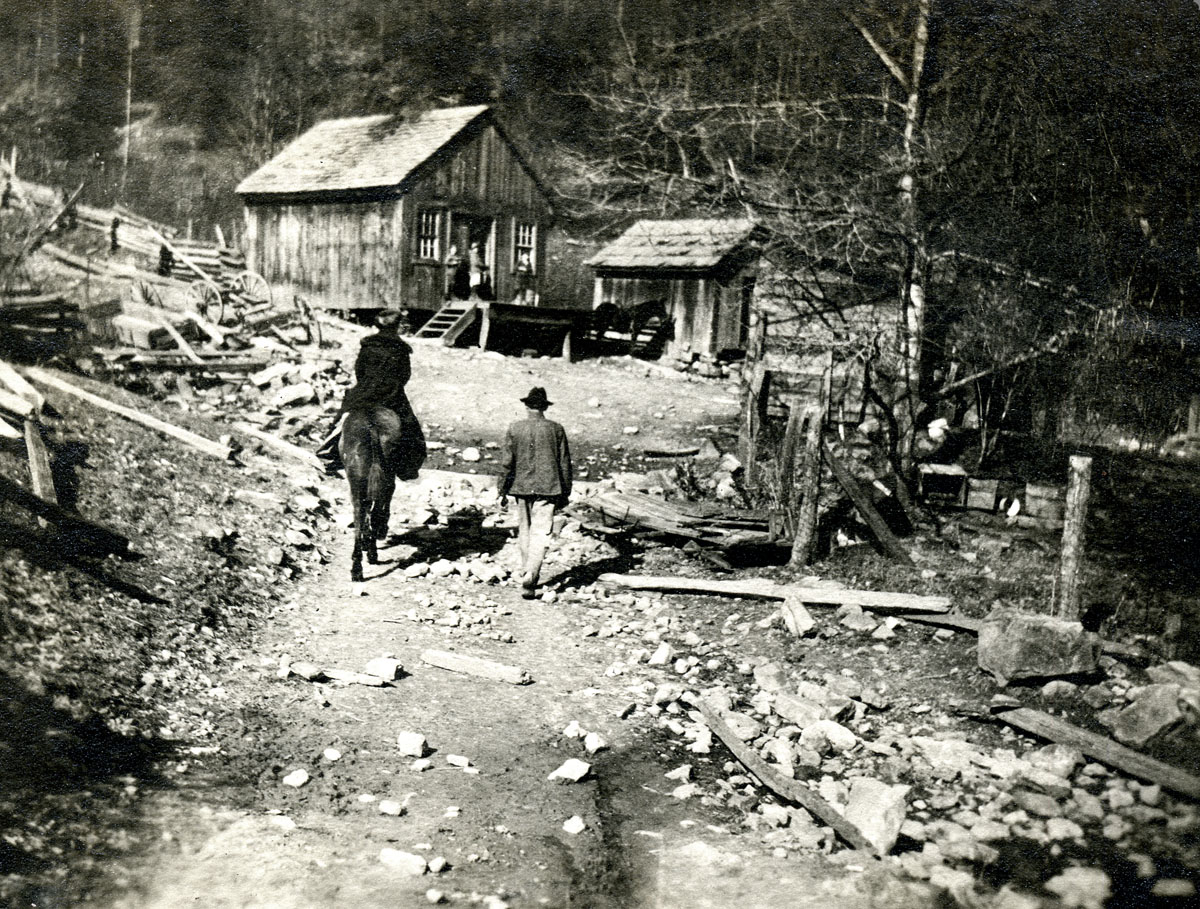
“Helen Wilmer Stone.” [047_IV_FN_03a_024.jpg]
Stone’s responsibilities at Pine Mountain are described as that of housemother, but there are indications that she also taught classes at the School and assisted with basic responsibilities at the School. Above, she appears to be headed to the local post office at Pine Mountain to pick up mail. Housemothering, her primary concern at Pine Mountain, was often seen as a teaching position, as vocational training, and as hygiene promoter — all part of the School’s educational program.
Not everyone was adept at “mothering” but Wilmer Stone seemed to be quite at home in the role. There is evidence Wilmer was a much loved and admired housemother during her almost nine years at the institution.
HELEN WILMER STONE (VINER): Her Weaving Scrapbook
While a student at Vassar, Stone had majored in political science even though her responsibilities at Pine Mountain appear to have always been that of a housemother and her interests always tended toward craft. A small scrapbook of weaving samples and notes held by John C. Campbell Folk School (and digitized by Western Carolina’s Hunter Library) show Stone’s craft interests and also her careful work at documenting mountain craft. Apparently, she passed the scrapbook along to Clementine Douglass where it was finally donated to John C. Campbell Folk School. It is clearly marked by Wilmer Stone’s hand as having been created at Pine Mountain. The weaving samples in the scrapbook distinctly show her interest in local craft and reveal common natural dyes and patterns found in the locale.
During the early years of the Pine Mountain Settlement School, “housemothering” was considered to be as important a job as that of a classroom teacher. Formal education was carefully integrated into social interactions and into industrial tasks and training. Weaving became a large focus of the industrial training for many students, as well as a revenue producer for the School. Essentially, all activity at the School was to be a part of the student’s education. The scrapbook possibly served several purposes for Wilmer Stone, not the least of which was a ready-made instruction book for students and staff.
HELEN WILMER STONE (VINER): In Saluda, North Carolina
After their eight years at Pine Mountain, both Helen Wilmer Stone and her close friend, Marguerite Butler, left the School in 1922. Marguerite headed for John C. Campbell Folk School and Wilmer aimed to return to and re-settle in Saluda where she had spent many happy childhood days. Both the John C. Campbell Folk School in Brasstown and the town of Saluda are in North Carolina. Saluda, a small town near the South Carolina border, was well known even in her childhood days as a center for craft and had a wealthy summer population as well as many year-round artisans and writers.
In Saluda, Stone soon established a weaving cooperative and a retail store, the Weaving Shop, in 1923 with her friend Clementine Douglass. Both women shared an interest in weaving and particularly weaving with naturally dyed yarns. The lessons Stone had learned at Pine Mountain transferred well to her new endeavors, to her old and new friendships, and to her business ambitions.
Douglass had met Stone during her summers in Harlan, Kentucky, where she was working for several summers. When she traveled to nearby Pine Mountain to learn vegetable dyeing from Stone and to mountain homes that were still weaving in the 1920s the two became fast friends. Douglass had been inspired to turn to weaving as an enterprise by her summer work at the Smith Community Life School in Harlan County, not far from Pine Mountain.
Both Stone and Douglass became a part of the early forerunners of the so-called Craft Revival Movement in North Carolina and found a supportive community in Saluda and near-by Tryon. The two had taken residence in a small cottage called “Shanty Shane” which served as both residence and early shop featuring their work.
Stone was able to make a productive operation of the Weaving Shop but Clementine Douglass soon moved on to Asheville, NC, where she could care for her ailing mother more comfortably. Once settled, Douglass established her own shop, the Spinning Wheel.
HELEN WILMER STONE VINER: Marriage to Henry Viner 1930
Helen Wilmer Stone married Henry Edward Scrope Viner on May 7, 1930, in Saluda. His parents were Mary (Bonser) and William Henry Viner. According to “Henstridge” on Wikipedia and his Certificate of Death, he was born at Henstridge House, England, on November 25, 1887. Although recorded as a “gentleman farmer,” he was also a violin maker who lived in Tryon, Polk County, NC, and was retired from the Episcopal ministry. Wilmer and Henry Viner had one son, Alexander Edward Scrope Viner (1932-1994).
HELEN WILMER STONE VINER: Craft Enterprises in North Carolina
Stone’s early venture into marketing craft was not new to the area, as Edith Stuyvesant Gerry Vanderbilt had established a craft enterprise in Biltmore Village near Asheville, and enlisted the aid of Charlotte Yale and Eleanor Vance to run the operation. Frances Goodrich had a well-established program for cottage industries which he founded in 1908 at Allenstand (or, Allanstand). Wilmer Stone’s weaving business was surrounded by craft enterprises and many became a legend in the history of the so-called Craft Revival Movement.
By the early 1950s, after several years in Saluda, Wilmer and her husband had moved to nearby Tryon. Yale and Vance sold their Biltmore weaving business to Fred Seely (which he industrialized in his Biltmore Industries in Asheville, NC). When Yale and Vance moved from Asheville, they became an integral force in the Craft Movement in Tryon, a small Summer retreat near Saluda. It was this move that brought Helen Wilmer Stone into the circle of the two powerful craft enthusiasts. The town of Saluda and that of Tryon was rich in women-powered craft enterprise and the Viners and Yale and Vance became both neighbors and friends.
The other important artisan in the area, Frances Goodrich, and her early shop, the Allenstand Cottage Industries, later moved to Asheville. When Goodrich eventually turned over her business to the evolving craft Guild that later gave birth to the Southern Highland Craft Guild, the most important center for craft in the Appalachian Central and Southern Highlands.
**********
Helen Wilmer (Stone) Viner died in Polk County on July 25. 1978. Henry Edward Scrope Viner died at age 72 in Tryon, NC, on November 20, 1959.
GALLERY: Helen Wilmer Stone Viner
- PMSS workers (from left): Katherine Pettit; Ethel de Long; Wilmer Stone; (?); Ruth Hench; Dr. Grace Huse; (?); Evelyn Wells; (?); Marguerite Butler; Luigi Zande. [X_099_workers_2489c_mod.jpg]
- Miss Wilmer Stone and Mr. Luigi Zande. [X_099_workers_2508_mod.jpg]
- Wilmer Stone writing at desk. Location unknown. X_099_workers_2521a_mod.jpg
- Wilmer Stone Viner with large bouquet and group of children. X_099_workers_2523b_mod.jpg
- Delia Creech and Wilmer Stone.Angela Melville Album II. Part III. “Delia Creech — Wilma Stone.”[melv_II_album_126.jpg]
CORRESPONDENCE GALLERY: Helen Wilmer Stone Viner
- Helen Wilmer Stone correspondence. [stone_w_001.jpg]
- Helen Wilmer Stone correspondence. [stone_w_002.jpg]
- Helen Wilmer Stone correspondence, page 1 of 2. [stone_w_003.jpg]
- Helen Wilmer Stone correspondence, page 1 of 2. [stone_w_004.jpg]
|
Title |
Helen Wilmer Stone Viner |
|
Alt. Titles |
Helen Wilmer Stone , Wilmer Stone ; Wilmer Viner ; Mrs. Henry Viner ; |
|
Identifier |
https://pinemountainsettlement.net/?page_id=15172 |
|
Creator |
Pine Mountain Settlement School, Pine Mountain, KY |
|
Alt. Creator |
Ann Angel Eberhardt ; Helen Hayes Wykle ; |
|
Subject Keyword |
Helen Wilmer Stone ; Helen Wilmer Stone Viner ; Pine Mountain Settlement School ; Philis Alvic ; Vassar College ; Marguerite Butler ; mountain craft ; housemothers ; teachers ; vocational training ; hygiene education ; John C. Campbell Folk School ; Weaving Shop ; cottage industries ; Clementine Douglass ; vegetable dying ; Shanty Shane ; Spinning Wheel ; weaving ; Smith Community Life School ; craft revival movement ; Henry Edward Scrope Viner ; Edith Vanderbilt ; Biltmore Village ; Charlotte Yale ; Eleanor Vance ; Frances Goodrich ; Allenstand (Allanstand) Cottage Industries ; craft enterprises ; Biltmore Estate Industries ; Southern Highland Craft Guild ; scrapbooks ; weaving samples ; Hunter Library ; Pine Mountain, KY ; Red Fish, LA ; Saluda, NC ; Ashville, NC ; Allanstand, NC ; |
|
Subject LCSH |
Stone, Helen Wilmer,– c. 1891- 1978. |
|
Date |
2010-01-08 aae |
|
Publisher |
Pine Mountain Settlement School, Pine Mountain, KY |
|
Contributor |
Michael McCue, Tryon, NC |
|
Type |
Text ; image ; |
|
Format |
Original and copies of documents and correspondence in file folders in filing cabinet ; photography album(s) ; |
|
Source |
Series 09: Biography – Staff/Personnel |
|
Language |
English |
|
Relation |
Is related to: Pine Mountain Settlement School Collections, Series 09: Biography – Staff/Personnel |
|
Temporal Coverage |
1893 – 1984 |
|
Spatial Coverage |
Pine Mountain, KY ; Red Fish, LA ; Saluda, NC ; Ashville, NC ; Allanstand, NC ; |
|
Rights |
Any display, publication, or public use must credit the Pine Mountain Settlement School, Pine Mountain, KY. Copyright retained by the creators of certain items in the collection, or their descendants, as stipulated by United States copyright law. |
|
Donor |
n/a |
|
Description |
Core documents, correspondence, writings, and administrative papers created by or addressed to Helen Wilmer Stone ; clippings, photographs, publications by or about Helen Wilmer Stone. |
|
Acquisition |
n/d |
|
Citation |
“[Identification of Item],” [Collection Name] [Series Number, if applicable]. Pine Mountain Settlement School Institutional Papers. Pine Mountain Settlement School, Pine Mountain, KY. |
|
Processed by |
Ann Angel Eberhardt ; Helen Hayes Wykle ; |
|
Last updated |
2010-01-08 aae ; 2013-10-29 aae ; 2014-04-18 hhw ; 2014-08-03 hhw ; 2014-09-08 ; 2014-12-21 hhw ; 2014-12-31 aae ; 2017-06-07 aae ; 2020-05-02 aae ; 2020-12-31 hhw; |
|
|
Sources “North Carolina Deaths and Burials, 1898-1994”, database, FamilySearch (https://familysearch.org/ark:/61903/1:1:H4MC-ZXN2 : accessed 02 May 2020) Mary Bonser in entry for Henry Edward Scrope Viner, 1959. Stone, Helen Wilmer. Series 09: Biography – StaffPersonnel. Pine Mountain Settlement School Institutional Papers. Pine Mountain Settlement School, Pine Mountain, KY. Archival material. University of North Carolina Asheville Special Collections, Fred Loring Seely Papers. http://toto.lib.unca.edu/findingaids/mss/FredLoringSeely.html Western Carolina University, Hunter Library Digital Collections, Craft Revival. Special thanks to Michael McCue, aAsheville, NC writer and publisher, CONDOR PRESS, Tryon, NC, for his many informative emails and useful discussions on the Craft Revival in the Saluda and Tryon, NC area. Bibliography Alvic, Philis. Weavers of the Southern Highlands. Lexington, KY: University Press of Kentucky, 2003. Print. Becker, Jane S. Selling Tradition: Appalachia and the Construction of an American Folk, 1930-1940. Chapel Hill: University of North Carolina Press, 1998. Internet resource. Craft Revival: Shaping Western North Carolina Past and Present. Cullowhee, N.C: Hunter Library, Western Carolina University, 2006. Internet resource. Davison, Marguerite Porter. A Handweaver’s Pattern Book, self-published, 1944 [first printing]; Swarthmore, PA, 1950; 1989 [26th printing]. Print. Davison, Marguerite P. A Handweaver’s Pattern Book for Four-Harness Looms. Swarthmore, Pa: The author, 1945. Print. Dupuy, Edward L. Artisans of the Appalachians. Miller Print. Co, 1967. Print. Goodrich, Frances L, and Jan Davidson. Mountain Homespun: A Facsimile of the Original, Published in 1931. Knoxville: University of Tennessee Press, 2010. Internet resource. |
Return To:
BIOGRAPHY – A-Z
see Also:
DANCING IN THE CABBAGE PATCH Weaving at PMSS Beginnings

